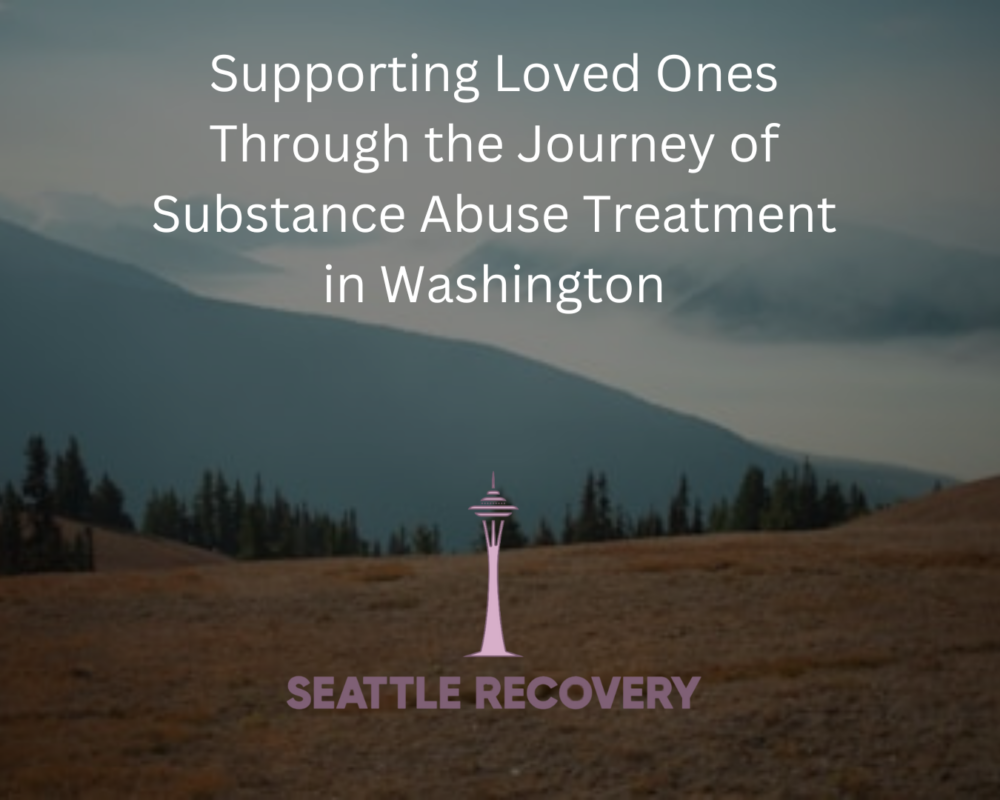Substance abuse is a deeply challenging experience, not just for those who are directly affected but also for their families, friends, and loved ones. For individuals struggling with addiction, the road to recovery can be long and fraught with difficulties. However, with the right support, recovery is possible. As a mental health and substance abuse treatment center based in Seattle, Washington, Seattle Recovery understands the complexities of this journey. In this blog post, we will explore how you can support your loved ones through the process of substance abuse treatment in Washington.
Getting Substance Abuse Treatment in Washington
Seeking substance abuse treatment can be a daunting and overwhelming decision. However, it is a crucial step towards recovery and a healthier, happier life. In Washington state, there are many options for substance abuse treatment centers, but not all may meet your specific needs or provide the level of care you or your loved one requires. At Seattle Recovery, we understand that each person’s journey to recovery is unique and requires an individualized approach. That’s why our team of experienced professionals works closely with each client to create personalized treatment plans that address their specific challenges and goals.
Located in the beautiful city of Seattle, our facility offers a safe and supportive environment for individuals seeking substance abuse treatment. We provide a range of evidence-based therapies and services, including individual and group therapy, medication management, and holistic approaches like yoga and mindfulness practices. Our program also offers support for co-occurring mental health disorders, as we believe that treating the whole person is crucial to long-term recovery.
At Seattle Recovery, we pride ourselves on our compassionate and non-judgmental approach to substance abuse treatment. We understand that addiction is a disease and not a moral failing, and our team is dedicated to helping individuals overcome their struggles with empathy and understanding. Additionally, we offer ongoing support even after treatment through our alumni program, which provides resources and connections to help clients maintain their sobriety.
Supporting Your Loved Ones Through Treatment
While seeking substance abuse treatment is ultimately the individual’s decision, loved ones can play a crucial role in supporting their journey to recovery. Here are some ways you can support your loved one through the process:
- Educate yourself: Learning about addiction and the treatments available can help you understand what your loved one is going through and how you can best support them.
- Communicate openly: Having open and honest communication with your loved one can create a safe space for them to share their struggles and feelings. It also allows you to express your concerns and offer encouragement.
- Be patient and understanding: Recovery is a challenging process, and there may be setbacks along the way. It’s essential to be patient and understanding, avoiding judgment or criticism.
- Take care of yourself: Supporting a loved one through substance abuse treatment can also take an emotional toll on you. Make sure to prioritize self-care and seek support for yourself when needed.
At Seattle Recovery, we understand the importance of involving loved ones in the recovery process. That’s why we offer family therapy and education to help families better understand addiction and learn healthy ways to support their loved ones’ recovery journey. We believe that with the right support system, individuals have a higher chance of achieving long-term sobriety.
The Importance of Support in the Recovery Process
Substance abuse often stems from a combination of factors, including genetics, trauma, environmental influences, and mental health issues. While professional treatment plays a critical role in recovery, the involvement of family and friends is just as crucial. Recovery is not a solitary journey, and having a strong support system can significantly improve outcomes.
Loved ones can provide emotional, physical, and practical support during substance abuse treatment, but it’s important to understand what that support should look like at different stages of recovery. To be effective, support must be patient, compassionate, and informed. When a loved one is going through substance abuse treatment in Washington, being equipped with knowledge can make a world of difference.
Understanding the Treatment Process
Before diving into how to support someone in recovery, it is helpful to understand the basics of substance abuse treatment. The treatment process typically begins with an assessment, during which a healthcare professional evaluates the individual’s substance use, physical health, and mental health to create a personalized treatment plan. From there, treatment options may include:
- Detoxification – This is often the first step, helping individuals safely remove substances from their bodies. It may involve medical supervision, especially for those who are addicted to substances like alcohol or opioids, where withdrawal can be dangerous.
- Inpatient or Outpatient Programs – Depending on the severity of the addiction, treatment can be residential (inpatient) or done on an outpatient basis. Inpatient treatment provides intensive, round-the-clock care, while outpatient programs offer more flexibility for those who need to balance treatment with other responsibilities.
- Therapy and Counseling – Both individual and group therapy are critical aspects of recovery. Therapy helps individuals explore the underlying causes of their addiction, develop coping strategies, and gain tools for long-term sobriety.
- Medication-Assisted Treatment (MAT) – For certain substances like opioids and alcohol, medications may be prescribed to reduce cravings and withdrawal symptoms, making the recovery process more manageable.
- Aftercare and Support Groups – Once the formal treatment phase ends, aftercare services and ongoing participation in support groups, such as Narcotics Anonymous (NA) or Alcoholics Anonymous (AA), are essential for maintaining sobriety.
Knowing the basics of substance abuse treatment in Washington will allow you to better understand what your loved one is going through and how you can assist them in their journey.
The Role of Family and Friends in Supporting Recovery
Family and friends play a pivotal role in supporting a loved one through their recovery process. While the individual undergoing treatment is responsible for their own healing, your involvement can provide immense encouragement. Here are a few ways you can support someone in substance abuse treatment:
1. Educate Yourself About Addiction and Recovery
The first step in providing meaningful support is understanding addiction and recovery. Substance use disorder is a medical condition that affects the brain and behavior. People who struggle with addiction are not weak or morally flawed—they are dealing with a disease that requires medical treatment and long-term management.
At Seattle Recovery, we often emphasize the importance of education for both the individual in treatment and their loved ones. Understanding that addiction is a chronic illness helps eliminate the stigma and shame often associated with substance abuse. It also empowers you to be a compassionate, empathetic support system.
2. Encourage Treatment Participation
Your loved one may experience a range of emotions while going through substance abuse treatment in Washington—guilt, shame, frustration, or fear. Some may even question whether recovery is worth the effort or whether it’s possible to succeed. During these times, your role as a supporter is to gently encourage them to stay in treatment and keep moving forward.
While it’s important to give them space when needed, you can also help motivate them by showing that you believe in their ability to overcome addiction. Be supportive of their treatment decisions, and let them know you are there for them every step of the way.
3. Participate in Family Therapy or Support Groups
In many treatment programs, including those offered at Seattle Recovery, family therapy is an integral part of the healing process. Substance abuse affects not only the individual but the entire family dynamic. Family therapy provides a space where everyone can express their feelings, work through challenges, and learn how to heal together.
Participating in support groups for family members, such as Al-Anon or Nar-Anon, can also provide you with additional tools to cope with your loved one’s addiction and recovery. These groups are designed to support people who are affected by a loved one’s substance abuse, helping you understand your feelings and giving you strategies to navigate this difficult journey.
4. Set Boundaries and Practice Self-Care
While it’s crucial to be there for your loved one, it’s equally important to set healthy boundaries. Enabling behaviors, such as covering up for them or excusing their actions, can impede their recovery. As difficult as it may be, you must recognize that your loved one is responsible for their own healing journey.
Setting boundaries also means taking care of your own mental health. Supporting someone through substance abuse treatment can be emotionally exhausting. Ensure you have outlets to de-stress, whether that’s through exercise, hobbies, talking with a therapist, or spending time with other loved ones. Your well-being is just as important as your loved one’s.
5. Celebrate Milestones
Recovery is a long process, but even small milestones deserve recognition. Celebrating achievements, whether it’s completing a month of sobriety or successfully managing cravings, can reinforce positive behavior and provide hope.
Acknowledging their progress can also motivate your loved one to continue on the path of recovery. A simple “I’m proud of you” can make a huge difference in their confidence and resolve.
6. Be Patient and Compassionate
The journey of recovery is often a bumpy road with setbacks, relapses, and moments of self-doubt. Patience is key. Understand that healing takes time and that progress may not always be linear. In fact, setbacks are a normal part of the recovery process.
When relapses or challenges occur, avoid blaming or shaming your loved one. Instead, focus on providing encouragement and help them get back on track. It’s essential to show that you are still there for them, even during tough times. Your continued support can help them regain their focus on recovery.
Finding the Right Treatment Center for Your Loved One
If your loved one is seeking substance abuse treatment in Washington, it’s important to choose a facility that offers the right level of care. Seattle Recovery is proud to provide a range of treatment options designed to meet the unique needs of each individual. From medical detox to inpatient and outpatient care, we work closely with patients to develop personalized treatment plans that promote long-term recovery.
The right treatment center will offer a combination of medical care, mental health support, and therapeutic services to help individuals address the root causes of their addiction. It’s also essential to select a facility that values family involvement and includes loved ones in the recovery process.
At Seattle Recovery, we understand that recovery is a team effort. Our holistic approach to substance abuse treatment in Washington not only focuses on the individual but also supports their family members through the healing process. We offer counseling, support groups, and educational resources to empower families and improve outcomes for everyone involved.
Conclusion
Supporting a loved one through substance abuse treatment is never easy, but it is one of the most important roles you can play in their journey to recovery. By educating yourself, encouraging treatment, setting healthy boundaries, and being patient and compassionate, you can make a profound impact on their success. If you are looking for substance abuse treatment in Washington for your loved one, know that Seattle Recovery is here to help guide both the individual and their family through this difficult yet rewarding journey.
Recovery is possible, and with the right support, your loved one can build a life of sobriety, health, and happiness. It may be a long road, but with patience, love, and the right resources, you and your loved one can navigate the ups and downs of recovery together.
If you or a loved one is ready to take the first step in recovery, reach out to Seattle Recovery today. We are here to support you every step of the way. Give us a call at (206) 231-0252 or visit our website at www.seattlerecovery.org.








